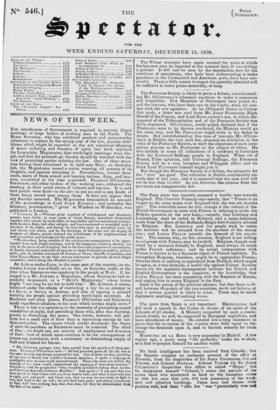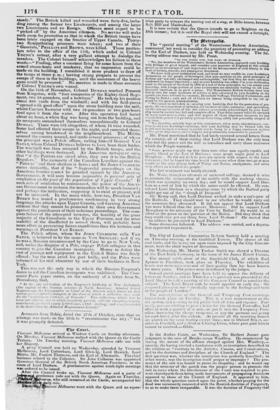No fresh intelligence has been received from Canada; but the
Gazette supplies an authentic account of the affair at Prescott, from the despatches of Sir JOHN COLBORNE, Colonel YOUNG, and Colonel DUNDAS. Colonel Yocum (in Sir JOHN COLBORNE'S despatches this officer is called '4 Major,' but he designates himself "Colonel,') states the amount of the entire band who attempted to land on the Canadian slime at 800, but says that only_ 400 took possession of the wind- mill and adjacent buildings. These men bad chosen their position well, and their "rifle fire "was "particularly true aust steady." The British killed and wounded were forty-five, inclu- ding among the former two Lieutenants, and among the latter two Lieutenants and an Ensign. Officers must expect to be "picked off" by the American riflemen. No service will make such room for promotion as that in which the British troops have been lately engaged on the frontier of Upper Canada. Thirty- two Sympathizing prisoners were taken; and two of their "Generals," PHILLIPS and BROWN, were killed. These particu- lars refer to the affair of the 13th, which ended in Colonel YOUNG'S retreat, after a very gallant attempt to dislodge the invaders. The Colonel himself acknowledges his failure in these words—" Finding, after a constant firing for some hours from the armed steam-boats and musketry, that no impression could be made on the building, I considered it more prudent to draw off the troops at three p. m.; leaving strong picquets to prevent the escape of those in the buildings, until the assistance of the heavy guns could be procured." No mention is made in these accounts of Colonel YOUNG'S own wound.
On the 15th of November, Colonel DUNDAS reached Prescott from Kingston, with "four companies of the Eighty-third Regi-
ment, two 18-pounders, and a howitzer? He took up his position
about 400 yards from the windmill; and with his field-pieces "opened with good effect" upon the stone building near the mill, whilst Captain SANDOM With two 18-pounders in two gun-boats
fired upon it from the water. After this operation had lasted about an hour, a white flag was hung out from the building, and Its occupants surrendered themselves unconditionally to Colonel
DUNDAS. There were 102 altogether, of whom 16 were wounded. Some had effected their escape in the night, and concealed them-
selves among brushwood in the neighbourhood. The Militia
scoured the country around, and made several prisoners; of whom the principal was a Polish officer, calling himself General VAN SAULT, whom Colonel DUNDAS believes to have been their leader.
he windmill was then occupied by the British troops, and the other buildings were destroyed. An American newspaper says, that " if the Patriots are saved alive, they owe it to the British Regulars." The animosity of the Canadian Loyalists against the " Patriots " and their abettors is fierce; and SIC JOHN COLBORNE States distinctly, that if the " disgraceful proceedings on the American frontier cannot he guarded against by the American Government, it will soon become impossible to prevent acts rf retaliation on the part of the population of Upper Canada." If such acts of retaliation be commenced, the power of the Amori- can Government to restrain the marauders will be much lessened ;
and perhaps the inclination, supposing it to exist at present, will
not he increased. In the mean while, however, President VAN BUREN has issued a proclamation condemning in very strong
language the attacks upon Upper Canada, and warning American
citizens that they cannot be protected by their own Government against the punishment of their nefarious proceedings. The com- plete failure of the attempted invasion, the hostility of the great majority of the Canadians in the Upper Province, and the utter inability of the disaffected to second them, will probably have more effect in preventing future expeditions than the lectures and warnings of President VAN BUREN.
The Polish officer, whom SIC JOHN COLBORNE calls VAN SAULT, is believed to be the same as VON SHOULTE ; and if so, be was a Russian commissioned by the Czar to go to New York, and, under the disguise of a Pole, engage Polish refugees in this country to join the Canadian insurgents. Money to defray the cost of passage and equipment in the Unit( d States was freely
offered : but the man acted his part badly, and the Poles were informed of his real character by one of their brethren in New York.
This was not the only way in which the Russian Emperor's desire to aid the Canadian insurgents was exhibited. The Com- merce Paris paper states, on the authority of a letter front St. Petersbur4, that, " At the late celehration of the Emperor's birth-day at New Archangel, (the capital of the Russian colonies in North America) Admiral Count Kupreseamn, the Cm lllll ander in Chief of the Russian naval forces on that station, gave a spletith.1 banquet, at the close of whieh a COMei ill'? teas ',bolo for the • ii,,r;eraroite Patriots of Comulte.' This collection, which was 11, Mlle !Olt to which every lonly pt esent, without esreption, migerly contributed, !induced nearly t..),S00 francs, (112/. stet ling,) and let/8./41111/%44 to its dedihritiob by Admiral Kopresenoto himself."



























